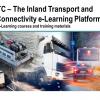News
Displaying Results 26 - 43 of 43
Technologies can enhance commerce if clear international standards are in place to ensure that their use is harmonized between trading partners, and if there is regulatory coherence among countries.
Ways in which digital and green transformations can improve quality infrastructure for trade in…
The global economy must be urgently steered away from unsustainable production and consumption patterns, which fuel the climate crisis, deplete natural resources and negatively impact both people and the environment. Global value chains are predominantly linear in nature, and the lack of…
The UN Secretary-General's Special Envoy for Road Safety, Mr. Jean Todt, is in Athens on 26 and 27 September to meet several high-level officials in Greece such as the Minister for Foreign Affairs, the Minister of Citizen Protection, the Minister of Infrastructure & Transports, the Minister of…
Are you interested in learning how to promote policies to strive towards sustainable transport and better trade connectivity? Do you want to learn about the UN inland transport and trade facilitation legal instruments and standards? Do you want to increase your capacity, knowledge base and skills…
With blockchain opening up many avenues in international trade – from facilitating financing and customs procedures to tracking due diligence and sustainability compliance – countries and companies are looking for successful practices to scale up their efforts to maximize the potential of this new…
UNECE and partners train 17 Sub-Saharan African Countries on the TIR/ eTIR and CMR /eCMR Conventions
UNECE teamed up with the Islamic Center for the Development of Trade (ICDT) and the Islamic Development Bank (IsDB) to organize a training workshop on International Road and Goods Transport Conventions for executives of the Ministries of Trade and Customs Administrations of 17 member countries of…
At what point do we cease to be alarmed by a shocking reality? Many of you may already be familiar with the following figures, from the last WHO Global Status Report on Road Safety (2018).
Every year 1.3 million people are killed and around 50 million injured on the world’s roads, often with…
The temporary importation of private and commercial vehicles is managed through “carnet de passages en douane” (CPD) on the basis of two international conventions (the 1954 Customs Convention on the Temporary Importation of Private Road Vehicles; and the 1956 Customs Convention on the Temporary…
Uzbekistan faces serious challenges in the realm of road safety, with around 3,600 people killed on its roads in 2018, according to WHO figures. Between January and March 2022 alone, 39 children lost their lives on the country’s roads, where 204 out of 1,469 road accidents involved children,…
Strengthening value chains between Africa and the European Union (EU) is a priority objective for sustainable growth and decent jobs across the two continents. Recent market imbalances and disparities, involving supply chain disruptions and lack of attention to the social and environmental impacts…
COP26 was a positive step forward in the fight against climate change, but as the UN Secretary General pointed out in his comments: “it is not enough. We must accelerate climate action to keep alive the goal of limiting the global temperature rise to 1.5 degrees.” The compromise deal reflects the…
The COVID-19 pandemic has brought about immense changes in how people move around the world. International travel ground almost to a halt at the onset of the crisis, as restrictions were imposed and borders closed. Internal migration, too, was restricted in many countries as lockdowns were declared…
The COVID-19 pandemic restrictions have brought the benefits of paperless trading to the forefront of attention. Many countries are considering issuing, accepting and exchanging electronic documents for paperless trading. Issues related to paperless trading are also at the core of World Trade…
The new UNECE Guide on producing CPI under lockdown, published today, helps national statistical offices to produce the Consumer Price index (CPI) under periods of lockdown and other emergencies.
The Consumer Price Index, or CPI, is a key economic indicator in most countries, giving a …
Developing the capacity of statistical systems to respond to ever-changing demands is a core component of UNECE statistical work, linked directly to several of the targets of the 2030 Agenda for Sustainable Development. Key tools used for capacity development have traditionally been face-to-face…
Countries of Central Asia, the Caucasus and Eastern Europe have been hit hard by the socioeconomic impacts of the COVID-19 pandemic, which threatens to derail sustainable development progress in the region.
However, there is also a stronger momentum towards regional cooperation, and countries can…
Mobility is a primary enabler of our economic and social life. However, despite its many benefits, the costs of mobility to societies around the world remain unacceptably high. These include greenhouse gas emissions (transport accounts for some 24% of global CO2 emissions, three quarters of which…
Decarbonizing transport and mobility remains a critical policy challenge, for which we must seize the recovery from the COVID-19 pandemic as a unique opportunity to accelerate progress. Decarbonization is one example of an issue where transport, health, and environment all meet – an intersection…



















